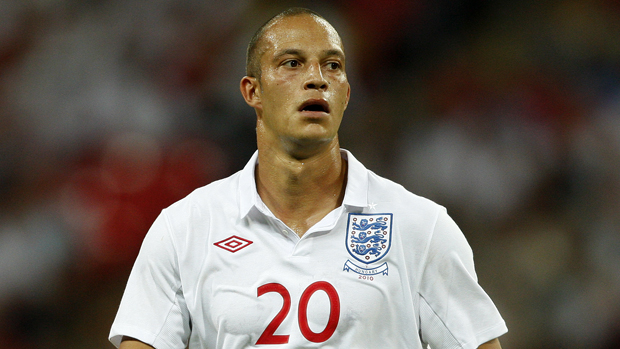Inside the mind of a striker
QPR and England frontman Bobby Zamora lets us inside the mind of a Premier League striker. Hold on tight....

Bobby Zamora, 30, is a striker for Premier League Fulham. A prolific start to his career with Bristol Rovers and Brighton & Hove Albion earned him a £1.5m move to Tottenham in 2003, but he couldn’t gain a regular place. After four years at West Ham, he signed for Fulham in 2008. Recovering from a slow start, he broke into the England set-up and made his international debut last year against Hungary.
How much does confidence affect your game?
Football is a confidence game; when you’re scoring, you can do no wrong. When it’s the other way round, everything goes wrong. The law of averages plays a part. If you’re shooting from distance 10 times a game, two might go in. If you’re not shooting, you’ve no chance. When you’re not on a run, you don’t want to shoot and will set up someone else. You see strikers come out of their shell when they’ve scored. Drogba is an example – once he’s scored, he’ll shoot from anywhere. When we played him, he was quiet. But after he scored, he came alive.
Are you superstitious?
Just silly little things. If I’ve scored in my boots, I won’t change them. My current boots are knackered, but I can’t change them now. I have to wait until I haven’t scored before I’ll bin them!
When things aren’t going well, do you start trying different things in training?
Last year I didn’t score a lot but I know the manager appreciated everything I was doing – it was just that the ball wasn’t going in. It was the worst season I’ve had for scoring but I didn’t do anything differently to what I do now. I know strikers are there to score, but in our team it’s different – we have to do a lot of defending, so if you’re not scoring, you make sure everything else is right.
Have you ever considered seeing a psychologist?
We had one at West Ham, Roberto Forzoni. He used to set us goals as a team. We were bottom of the league when he came in and we stayed up. I think it helped.
How difficult it is to perform when you feel like the crowd is getting on your back?
Every player at some stage has been pissed off with what people have said. It’s how you roll with it that’s important. You can’t let it get to you.
Try and explain that feeling when the ball hits the back of the net…
I know it’s a lame answer, but it’s brilliant. It’s not relief – more satisfaction. I take a lot of pleasure out of scoring.
Be honest, if the team win and you haven’t scored, are you a bit deflated?
No, I’m happy. There are some who might take pleasure in scoring two and losing 3-2, but because the end result isn’t what you wanted, it’s not the perfect scenario, no matter what you might have achieved on a personal level. For every Premier League team, apart from the top few, it’s about survival. The sooner you get points on the board the better.
What’s easier, an instinctive shot at goal or finding yourself with time in a one-on-one?
An instinctive shot, definitely. When you’ve got time, you think ‘Do I chip it, do I go round him?’ Don’t get me wrong, it’s still a quick thought process, but those different options are there.
They say talent alone won’t get you to the top. How important is the mental side of the game?
Talent is needed, but mental toughness is necessary. I’m sure few Premier League players lacked confidence at school. They were popular pupils, they had the banter. It’s that confidence thing.
There is massive pressure on players from the media. Does it get to you?
I can’t remember the last time I bought a newspaper – 99 per cent of what you read is just crap. Some people that write stuff haven’t got a clue about football. That’s not coming from me in a nasty way, but if I hear anything, I think ‘OK, whatever’. I don’t really watch football, either. If it’s Manchester United vs Barcelona, then maybe, but a run-of-the-mill league game, I don’t bother.
Is it good to be going onto the pitch with nerves in your stomach?
I very rarely have butterflies, certainly not at the big grounds like Old Trafford or Anfield. You don’t have anything to lose there. Everyone expects you to get beat, so if you go and have a good game against Rio Ferdinand it’s a bonus. It’s the games you’re expected to win that are the ones where there’s more tension. But I’m not a nervous person.
THE SHRINK'S DIAGNOSIS
Brad Busch, Mental skills coach from InnerDrive
“Bobby uses his experience well – he knows what works for him and plays to his strengths. He looks to learn, which no doubt played a key part in him becoming the player he is today.
It’s interesting that he’s had experience working on the mental side of his game before. No doubt more individualised work could see him push on even further. InnerDrive has been working with Carlton Cole over the past 20 months, a period which has seen him go from reserve team player through to England international.
One of the central tenets of our work is the belief that you never stop learning. Bobby demonstrates great ability to see the opportunity to improve. He knows that the people whose opinions matter are his manager and team-mates, and he doesn’t get sucked in to what other people say. He’s taking away a source of frustration, keeping his confidence high.
When one-on-one with a keeper, many forwards focus on what they don’t want. If a player thinks ‘don’t miss the target’, your brain creates the picture of the ball going wide.
Bobby describes his options in a positive command and in specific instructions. We coach players how to talk to themselves in such examples. This can have a huge impact on performance.
Bobby says he doesn’t watch football on TV, but learning from others is a good thing. We encourage clients to look at what the best are doing, with a view to improving their game.”
Also see:
Character team building
How to hold off your marker
Bobby Zamora: Tricks of the trade
Bobby Zamora on recovery
Inside the mind of a striker: Part Two
Get FourFourTwo Newsletter
The best features, fun and footballing quizzes, straight to your inbox every week.
